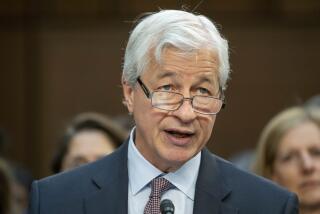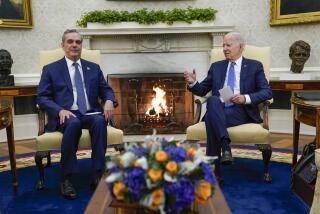Volcker Ties Expansion of Economy to Demand for U.S. Goods Abroad
- Share via
WASHINGTON — Declaring that “we can’t solve all the problems by ourselves,” Federal Reserve Board Chairman Paul A. Volcker said Wednesday that a resurgence in the stalled U.S. economy will depend heavily on increased demand for American products by our trading partners.
This is a “new kind of world for us to live in,” said Volcker, emphasizing that U.S. prosperity is possible only in a “buoyant” world economy.
The stimulation of domestic growth alone is “an inadequate policy instrument,” he told the Senate Banking Committee.
The Federal Reserve Board has been trying to accelerate business activity by lowering interest rates. And the board said last Friday that it is willing to keep expanding the money supply this year. The sluggish economy has become the major worry of Volcker and his colleagues, replacing nervousness over a prospective revival of inflation.
No Longer a Self-Sufficient Market
But any effort to assure prosperity by manipulating the money supply--helping to provide low-cost loans for corporations and individuals--will have limited value, Volcker warned.
No longer is the United States a self-sufficient market, was his message to the Banking Committee. The health of the domestic economy is “tied up with what’s happening in the rest of the world,” he said.
U.S. products are now more competitive in world markets because the dollar has fallen sharply in relation to some foreign currencies, notably the Japanese yen and West German mark. This makes American goods cheaper for foreign buyers.
American manufacturing firms, however, have not enjoyed a corresponding boost in export sales. The Reagan Administration, and now the Federal Reserve Board, say the problem lies with countries that are not providing enough growth in their own economies, notably West Germany and Japan.
These countries did not follow the Federal Reserve Board in its most recent drive toward lower interest rates. The Fed cut the discount rate on loans to its member banks to 6%. The lower rate charged to banks eventually will result in lower-cost loans to consumers, making it easier for them to borrow funds to buy homes, automobiles and other items.
Cheaper money for loans fuels the economy’s expansion. “The forward momentum of our economy has been sustained almost entirely by consumer spending and housing construction,” Volcker said.
But the weak spot is manufacturing, which is operating far below its capacity.
To grow faster, the U.S. economy must be rebuilt, shifting “more of our resources into exports and into recovering domestic markets where import penetration has been so high,” Volcker said. “That, very broadly, implies relatively more growth in manufacturing, relatively less growth in services, in governmental spending, or in other sectors, and more savings and less borrowing.”
Other industrial nations, by contrast, should do just the opposite, relying “less on exports and more on domestic sources of growth,” the Fed chairman said. An increased appetite for manufactured goods in Europe and Japan would provide more sales for American industry. With expanded revenues should come new investment in factories and equipment, creating more jobs for U.S. workers.
Difficult Time
“The rest of the world needs to achieve and maintain a momentum of home-grown expansion,” he said.
Volcker’s insistence on trade as the key to U.S. economic health comes at a politically difficult time. Congress, angered at the loss of domestic jobs to exports, is now considering a variety of protectionist measures.
The Fed chairman shares with the Reagan Administration a deep fear that any efforts to restrict imports could touch off an international trade war. But Congress is impatient. Sen. Alfonse M. D’Amato (R-N.Y.), a Banking Committee member, denounced Japan as a nation of “pirates” stealing American ideas and technology and then pouring products into the U.S. market.
Discussing Mexico’s negotiations to get new loans, Volcker praised the Mexican government for its efforts “in the midst of crisis to move toward a more open, competitive economy.”
$3.64 Billion in Funds
An agreement reached this week by Mexico with the International Monetary Fund, the World Bank and the Inter-American Bank for Development should provide Mexico with $3.64 billion.
“But Mexico is calling upon commercial banks, with so much already at stake, to play a large role as well,” Volcker noted. Mexico owes $97 billion, and banks are loath to provide new funds.
But the Mexican government, and Volcker as well, believe that the banks should advance more funds. “They ought to take some risks . . . considering the risks they already have,” Volcker said, noting that the banks had enjoyed a profitable relationship in their previous dealings with Mexico.
Mexican officials hope the agreement with the three international agencies will encourage commercial banks to provide as much as $9 billion in new loans. Mexico needs the funds because the plunge in oil prices has cut deeply into revenue from its main export product.
More to Read
Inside the business of entertainment
The Wide Shot brings you news, analysis and insights on everything from streaming wars to production — and what it all means for the future.
You may occasionally receive promotional content from the Los Angeles Times.










